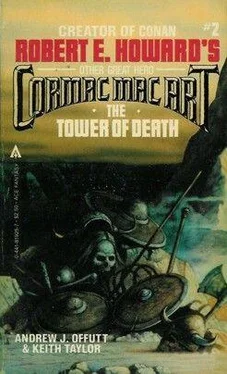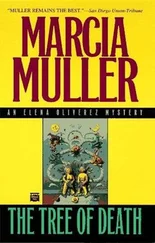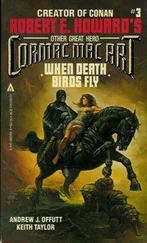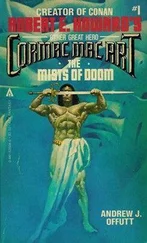Andrew Offutt - The Tower of Death
Здесь есть возможность читать онлайн «Andrew Offutt - The Tower of Death» весь текст электронной книги совершенно бесплатно (целиком полную версию без сокращений). В некоторых случаях можно слушать аудио, скачать через торрент в формате fb2 и присутствует краткое содержание. Жанр: Фэнтези, на английском языке. Описание произведения, (предисловие) а так же отзывы посетителей доступны на портале библиотеки ЛибКат.
- Название:The Tower of Death
- Автор:
- Жанр:
- Год:неизвестен
- ISBN:нет данных
- Рейтинг книги:3 / 5. Голосов: 1
-
Избранное:Добавить в избранное
- Отзывы:
-
Ваша оценка:
- 60
- 1
- 2
- 3
- 4
- 5
The Tower of Death: краткое содержание, описание и аннотация
Предлагаем к чтению аннотацию, описание, краткое содержание или предисловие (зависит от того, что написал сам автор книги «The Tower of Death»). Если вы не нашли необходимую информацию о книге — напишите в комментариях, мы постараемся отыскать её.
The Tower of Death — читать онлайн бесплатно полную книгу (весь текст) целиком
Ниже представлен текст книги, разбитый по страницам. Система сохранения места последней прочитанной страницы, позволяет с удобством читать онлайн бесплатно книгу «The Tower of Death», без необходимости каждый раз заново искать на чём Вы остановились. Поставьте закладку, и сможете в любой момент перейти на страницу, на которой закончили чтение.
Интервал:
Закладка:
Cormac whirled.
A few feet away stood Zarabdas, not robed but in a peasant’s cowled tunic that was a bit longish for the Sueves, falling skirted over leggings and gaitered buskins. The bald old man with the raven’s-wing beard was staring, and Cormac knew he’d been called more than once.
“Mac Art.”
“Aye. Zarab… das. Aye. What do ye here, Zarabdas?”
“The king has asked for you, and I had observed your pensive walking. I thought you’d have come here, to contemplate that which happed out there last night.” His nod compassed the sea and the tower standing over it. “But-I’ve called your name several times. You are all right?”
“I am all right, Zarabdas,” Cormac said, hardly of a mind to tell this unknown quantity of an eastern mage of his Remembering. To avoid further queries and discussion, he said, “It’s deep I was in thought, Zarabdas. Aye, deep in thought… what saw Zarabdas, the evening past?”
“I saw it, mac Art. I saw the kelp come from the sea like snakes, and I saw how it climbed, and was driven back. I heard your battle in the tower, and I saw the light die.”
“Was I extinguished it, after we beat off that demonstuff from the sea. Saw ye Wulfhere, or… what he saw?”
Zarabdas shook his head and his cowl slipped back; he stood in shade now, anyhow. “No. Only the dark, and the wind and the lightning, and crashing thunder. What did Wulfhere see?”
Cormac was still unsure as to whether to trust Zarabdas, but he told him. The Palmyran shook his head and looked grim.
“Manannan of the white steeds and sunlit waters is not the only god of the sea,” Cormac said darkly, looking upon the waters with one brow cocked. “It’s demons there are in the deep. Creatures that pull down sailors, good men and bad, down and down to their airless demesne… which men know by many names in many lands.”
The Palmyran mage studied him, wearing a strange expression.
“Aye, though probably more exists than you know of, Cormac mac Art.” Zarabdas seemed to stare at nothing and his sockets seemed nearly to swallow his dark eyes. “There are strange cults of Dagon hereabouts, spread about by Imperial legionaires in centures just past. And that dread belief and cult never dies, of the One who sleeps in sunken R’lyeh.”
“Of Dagon I know. but… Releeyuh? That word I know not.”
“R’lyeh. A most, most ancient cult-and foul. It’s said the horrid demons emanated from off this plane, and were on the earth afore our own kind arose from the slime.”
Cormac studied him, thinking. “Zarabdas… think ye any hereabouts yet practice the rites of this… R’lyeh…”
“…no no, that is the place , a city or mighty palace…”
“…who might be… calling up such… gods, or demons, or creatures whatever they be? Living moving kelp, and maidens on a ship of bone?”
“I have no knowledge of it.”
“Hmmm. Well… and the king is after asking for me, it’s best I return to his hall. Suppose we both be telling him what we know, and ask him about cultists, hereabouts.”
And so they did, met partway back to the old city by a mounted troop… The two men went to the king in his hall. There they gave him their knowledge and their surmises and their un-knowledge. And did the king know aught of any who practiced such dark cultism in his realm? Nay, but Veremund called in his Hispano-Roman advisor.
That hawk-beak, who bore the ancient name Vindex, came. With haughty Patrician distaste he did assurance on them that he knew of no such activity. Nor drew he too close to the Gaelic pirate. Vindex wore a lovely tunic of apple-green silk all broidered with goldwire thread. It was passing sweet, that garment, mac Art thought.
“Yet I’d not be wholly surprised at such a cult here,” Vindex said austerely, wearing his eyebrows halfway up his forehead. “Most peasants here are still pagan in basic belief, though they do profess adherence to the One Church.”
At this Veremund firmed his lip. Cormac held back his smile: he’d been apprised of the existence, in the king’s own most private quarters, of a most private little Remembrance of the old goddess Ertha; and Irnic Break-ax flaunted the device on his shield: it was the horned head of Arawn, the Old God of the fair people of Germania and Gallia and Britannia.
“Shall I inquire?” Vindex asked.
Staring at the king, Cormac shook his head almost violently. Veremund saw, and said nay. He also advised Vindex to keep silent on the matter altogether. The curly-haired man departed, tunic skirt swishing, eyebrows high, eyes just above the plane directly before them. Just the sort of fellow for whom being tripped would do a great deal of good, Cormac thought. Ah Caius Julius who was surely nigh as great a king as my namesake, what have ye wrought, and to what have your followers come?
“It is a matter to be investigated,” Zarabdas said. “I shall be most discreet, lord King.”
“So be it,” Veremund said, “and be so. Cormac?”
The Gael shook his head. “We must try again, of course. It’s several questions I have, King, but few answers. Methinks I’ll do a bit more pacing and cudgelling of this poor brain of mine.” No help here , he thought. Sure it’s long been said that Behl lends aid to him who aids himself!
Zarabdas gave him a look askance, with an eyebrow raised, and Veremund smiled. This uncatchable reiver was hardly known for a “poor” brain!
And once again Cormac mac Art went awalking, to be alone with his thoughts. He and his companions had come close to death in that tower. There must be another way to deal with the demon-weed, even though the door was being replaced at this moment-with bronze.
He walked. He liked this land well enow, with its green and blue-misted hills and dark forests beyond which grasses waved on rolling land often wetted by rain; not all that different from green, wet, sea-ringed Eirrin, was Galicia of the Suevi. It was a lovely afternoon for a walk. Despite his cares he felt light and springy, unweighted by armour or helm and with his left arm free of his shield’s fifteen pounds.
Meandering, he entered and paced through the dim coolth of a smallish wood, mostly oak and the chestnuts beloved of Galician swine. He thought much, but decided nothing. Indeed he found it hard not to dwell on the strangeness of that past-vision that came on him from time to time. With his sword he sliced the green shoot of a branchlet, and chewed it as he walked, ambling. Many months had passed since he’d dared walk carelessly abroad; was good to be welcome, someplace.
The gentle tinkling of bells impinged on his outer awareness just enough to cause him to turn his steps along a side path. Soon he emerged onto a long broad stretch of meadow. Here was beauty, under the sun and misted by the air of this seaside land of much rainfall.
Like the plains of Poitain…
Mac Art shook off that thought. “Galicia,” he muttered aloud, with firmness.
It was cattle he’d heard, he now saw, and belled; probably to prevent their calving in the woods and eluding their masters. Busy at the grass-pulling, these independent few; the rest of the herd lay about in that grove of piebald birch, chewing and belching and chewing.
It was a lovely afternoon.
Cormac ambled toward them, in the open now, and feeling ridiculous with his sword swinging at his hip in this pastoral setting. The farmers hardly wore swords! The farmers… peasants… What shrine or cleared area like a druid’s glade might lie hid in the deep darkness of that forest? He’d only just entered it, after all, traversing its bare edge. These peasants might well…
From the far side of the birch grove two horsemen appeared agallop, the one atop a bay, the other riding a garnet-hued animal. Both men wore leathern coats and, carried spears and shields, and both booted their galloping steeds. They appeared not to be Suevi, though one could not be certain; both men were helmeted. The tunic of one was of cross-hatched double-stripes, green and red on bland white homespun, while the other wore a sleeveless tunic of plain blue under his long leather vest bossed with copper whorls. Though mounted, neither man wore leggings.
Читать дальшеИнтервал:
Закладка:
Похожие книги на «The Tower of Death»
Представляем Вашему вниманию похожие книги на «The Tower of Death» списком для выбора. Мы отобрали схожую по названию и смыслу литературу в надежде предоставить читателям больше вариантов отыскать новые, интересные, ещё непрочитанные произведения.
Обсуждение, отзывы о книге «The Tower of Death» и просто собственные мнения читателей. Оставьте ваши комментарии, напишите, что Вы думаете о произведении, его смысле или главных героях. Укажите что конкретно понравилось, а что нет, и почему Вы так считаете.












